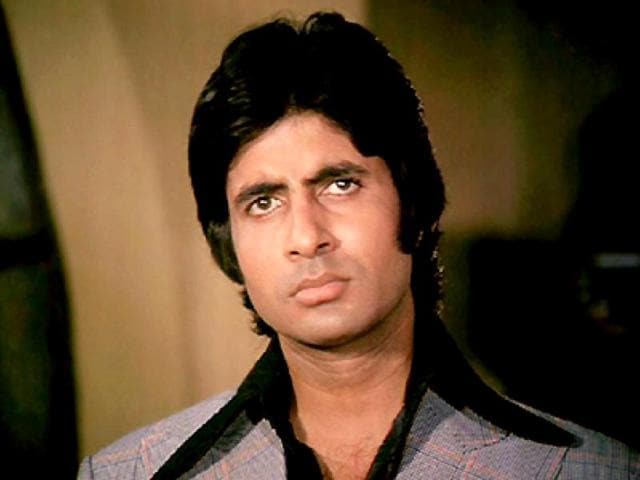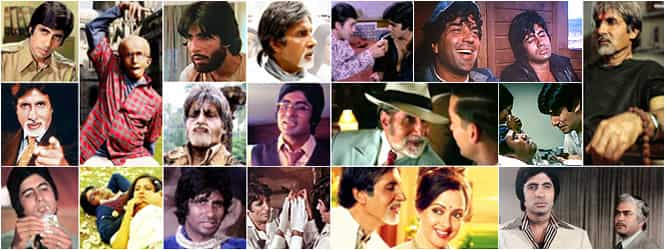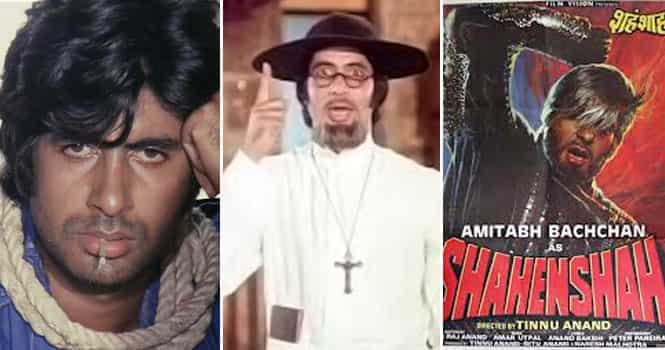The Anthony Gonsalves generation: What Bachchan means to a ’70s kid
It happened one evening. Sitting in an open-air theatre in our cantonment, huddling close to my mother, it was a magical moment, watching a man emerge out of a huge Easter egg singing 'My name is Anthony Gonsalves'. A fan recalls the Bachchan magic on his 72nd birthday.


Yet much of this was hardly of any significance to a 6-year old. Coming from largely conservative yet educated middle class Indian background, studies was all that mattered. Sport was the only other indulgence allowed. Barring that my parents did allow one more indulgence, strictly rationed though -- movies. We were allowed two films viewing a month in the hall. This was much before the TV era would begin.

'Anthony Gonsalves' is someone any Indian born in post independence India would easily know. It was a character Bachchan played in 1977 cult hit Amar Akbar Anthony. Along with Lata Mangeshkar, there’s one name that comes to mind when you think entertainment – .
It must take something God-given to be loved by such a spectrum of people. I vaguely recall college-going cousins keeping day-long fasts and praying for Amitabh Bachchan when death came knocking at his doorsteps after the unfortunate accident during the shooting of Coolie. I recall my uncle’s driver Liaqaat telling me as a 10-year old how his favourite Amitabh was Iqbal from Coolie and how his much-loved song was the one Iqbal sings as pilgrims leave for Hajj in the film. I recall how daddy, bhai and myself would all break into UP bhaiyya style jig, with various degrees of grotesqueness, as Bombay Doordashan's Hindi music programme Chhaya Geet would run 'Mere Anganey Mein Tumhara Kya Kaam Hai' from Laawaris.
It is in these little moments that an abiding image of the man, his craft, his staying power and finally his legend emerges. For most parts, Amitabh Bachchan is famous for belittling his greatness, much to the disgust, actually revulsion, of an avid fan like yours truly. Big B remains one of the most powerful images of modern India.
If pre-independent India lived with the romance of a Gandhi, Nehru and many other stalwarts of the freedom movement, post 1947 India owes much to its popular culture (cricket and Bollywood) for being the emblems of Indianness, however flawed.
In the years to come, I was to discover more and more of Bachchan magic. His voice, his suave, his style, his impeccable manners, his sophistication, his seamless blend of east and the west would all slowly but surely dawn on me. But the most iconic remains his acting.
I got to know first through his comedies. Dialogues that would regale me time and again –
Aisa toh aadmi life mein doich baar bhaagta hai,
Olympic ka race ho, ya police ka case ho’
-- Amar Akbar Anthony
Lo kallo baat. Arre babuji, aisi English aave that I can leave angrez behind. You see sir, I can walk English. I can talk English. I can laugh English. Because English is a very phunny language. Bhairon becomes Baron and Baron becomes Bhairon because their minds are very narrow.
-- Namak Halal
Tumhara naam kya hai, Basanti
-- Sholay
Such was his superb comic timing that few could match its acting prowess, be it the mirror scene in Amar Akbar Anthony or drunken act in ‘Daaru peene se liver kharab ho jaata hai’ from Satte Pe Satta. In movies after movies, Bachchan would regale with one comic expression or the other. Chupke Chupke, Don, Naseeb, Yaarana, Mr Natwarlal and countless others.Much later, I was to discover the ‘angry young man’. More than his anger perhaps, his defiance against a failing system was soon to make an imprint as was his signature intensity. In Deewar, when his character says: main aaj bhi pheke hue paise nahin uthaata’, it didn’t just speak indignation, there was the underdog’s cry for dignity.
When in Zanjeer, he knocks off the chair as the local goon leader called Sher Khan (played by legendary actor Pran) is about to sit, and says: ‘yeh police station hai, tumharey baap ka ghar nahin’, I marveled at the guts of a police officer taking on a corrupt system.
In Deewar’s famous dockyard fight scene, even as Bachchan takes on close to seven men, one wondered how could a man possibly pull off such a ‘heist’? But seeing the conviction in his eyes, seeing him throw himself heart and soul into the scene, one was compelled to believe the impossible – may be, just may be, this guy had it in him to do all this.
As the cynical doctor in Anand, when his character bursts on his dead patient’s chest, shouting: baat karo mujhse, Anand, I wondered wherefrom did such sensitivity come?
His underdog act in film after film would invariably tug at the leftist leanings in me. As Vijay, Bachchan excelled at mirroring the angst of the have-nots. As Deewar’s renegade son, as Trishul’s illegitimate son of a rich man, as the ‘adopted’ son of police officer who would turn up against his dacoit father and renegade brother in Parvarish, as the sacrificing friend who would pay with his life in Sholay, as the rebel who would fight the corrupt landlord in Khoon Pasina, as a coal miner who would stand up against the self-serving coal mine owners in Kala Pathar, Amitabh would leave a deep imprint as a rebel.
Of course, I wasn’t done yet. There was the romantic side to him too. Mind you, Bachchan was nothing like a conventional hero should like. He was way too lanky and tall, his face wasn’t the sorts that would make a million hearts miss a beat, but strangely he brought in certain masculinity and a certain sexual quotient to the classic Hindi film hero.On the face of it, there was just no softness in his demeanour so unlike his immediate predecessor, Rajesh Khanna from whom he was snatch the tag of ‘superstar’. There was no beguiling smile, no twinkling eyes, no tilt of the head, no emotional tugging of the heart strings for women to fall for. Yet in romances like Kabhie Kabhie, Silsila, Bemisal, Satte Pe Satta he wooed his woman with gutso and energy hitherto unknown. He made his woman revel in their femininity. Sexual love was fully explored. Even in films like Don, Namak Halal, Mr Natwarlal, Suhag etc that weren’t romances, the love sequences expressed mostly through songs, had tremendous audience approval.
My quintessential remains the ’70s star. Come the '80s and '90s, and it left me completed disinterested. Agneepath is said to be one of Bachchan’s best, but for me as a fan, the fount of his genius seemed to have dried with the coming of '80s and more so, '90s. May be, he had aged and no longer made sense like before. I had moved on to Shah Rukh Khan.
Cut to 2000. Kaun Banega Crorepati would change the rules of the game. Suddenly, on my TV set was a new Amitabh. Gone was the guy with hagged skin and slouch-ish body who was wooing women like Jaya Prada. In came a sophisticated and suave individual, straight up there at once at ease with his Indian roots as he was a consummate global citizen. His wit, charisma and humour would charm him to his audience. I recall trying lazily to dial into KBC number in a futile effort to earn some fortune and get to meet my star. Alas!
But KBC enthused a new life into Amitabh’s career. Suddenly, Bachchan was everywhere – from TV commercials to newspaper adverts to hoardings to what have you. It was as if he had moved from monotonous grih hasta ashram to a rocking vana prastha ashram. Man, who knew old age could be so damn cool! With this new found ‘coolness’ came a plethora of roles – anti-hero gangster in Sarkar (loosely based on Bal Thackeray), a 10-year old suffering from degenerative progeria in Paa, romantic hero in Cheeni Kum, an ageing father (quite a romantic one too!) whose children neglect him and his wife in Baghban and friendly ghost in Bhootnath. Wow!
But is this not all that endeared Bachchan to me? Not quite. In his background lay a significant measure of his appeal for me. The fact that his father is one of the stalwarts of Hindi romantic literature (Chhayawad) had a lot to do with it. The fact that his family nurtured deep relationship with Panditji and later on with Mrs Indira Gandhi was immensely attractive. Panditji had a knack of spotting talent. He did it with Atal Vihari Bajpayee and would repeat it with Harivans Rai Bachchan when he appointed him as his Hindi translator.
Many years ago, listening to Amitabh recite his famous father’s poems in a collection called Bachchan recites Bachchan, would leave a deep impact on me. It’s progressive and modern worldview has stayed with me since. The world may be crazy about Madhushala, but my personal favourites remain ‘Kavi Dwar Pe Rakt Ke Chhap’ and ‘Buddh Aur Dancing Hall’. The manner in which Amitabh would recite them made it amply clear that he understood the import of his father’s words and that’s what made it so special.It is combination of all these things that have added to the staying power of a man like Amitabh Bachchan. I have seen my father turn from someone who detested Bachchan for his larger than life portrayals (by the ’70s my dad, though an avid Raj Kapoor-Dilip Kumar admirer, had been completed taken in by new wave cinema of Shyam Benegal and Adoor Gopalakrishnan) to copiously crying like a child watching Bachchan play an Alzheimer-hit old man awaiting death in Black.
To quote Shakespeare in King Lear, Bachchan may be ‘four score and 10’ but to corrupt another famous Robert Frost line, I’d say Bachchan has ‘miles to go before he sleeps’.
Happy 72nd, my friend!
Get more updates from Bollywood, Amar Singh Chamkila Review, Hollywood, Music and Web Series along with Latest Entertainment News at Hindustan Times.




